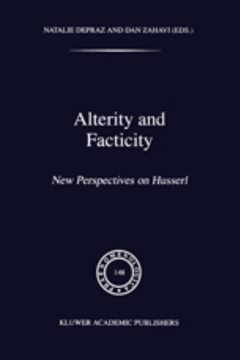Imagination and passivity Husserl and Kant
A cross-relationship
pp. 29-56
Abstract
Heidegger’s interpretation of the Kantian imagination is well-known: it has often been commented on2. By underlining the central character of the schematism in the Critique of Pure Reason and choosing to emphasize the first Transcendental Deduction which highlights imagination rather than understanding, Heidegger gave the critical imagination a leading-role within the fundamental ontology he had just begun to build at that time. In short, he endowed imagination with the meaning of an ungrounded ground (Abgrund).
Publication details
Published in:
Depraz Natalie, Zahavi Dan (1998) Alterity and facticity: New perspectives on Husserl. Dordrecht, Kluwer.
Pages: 29-56
DOI: 10.1007/978-94-011-5064-4_2
Full citation:
Depraz Natalie (1998) „Imagination and passivity Husserl and Kant: A cross-relationship“, In: N. Depraz & D. Zahavi (eds.), Alterity and facticity, Dordrecht, Kluwer, 29–56.


